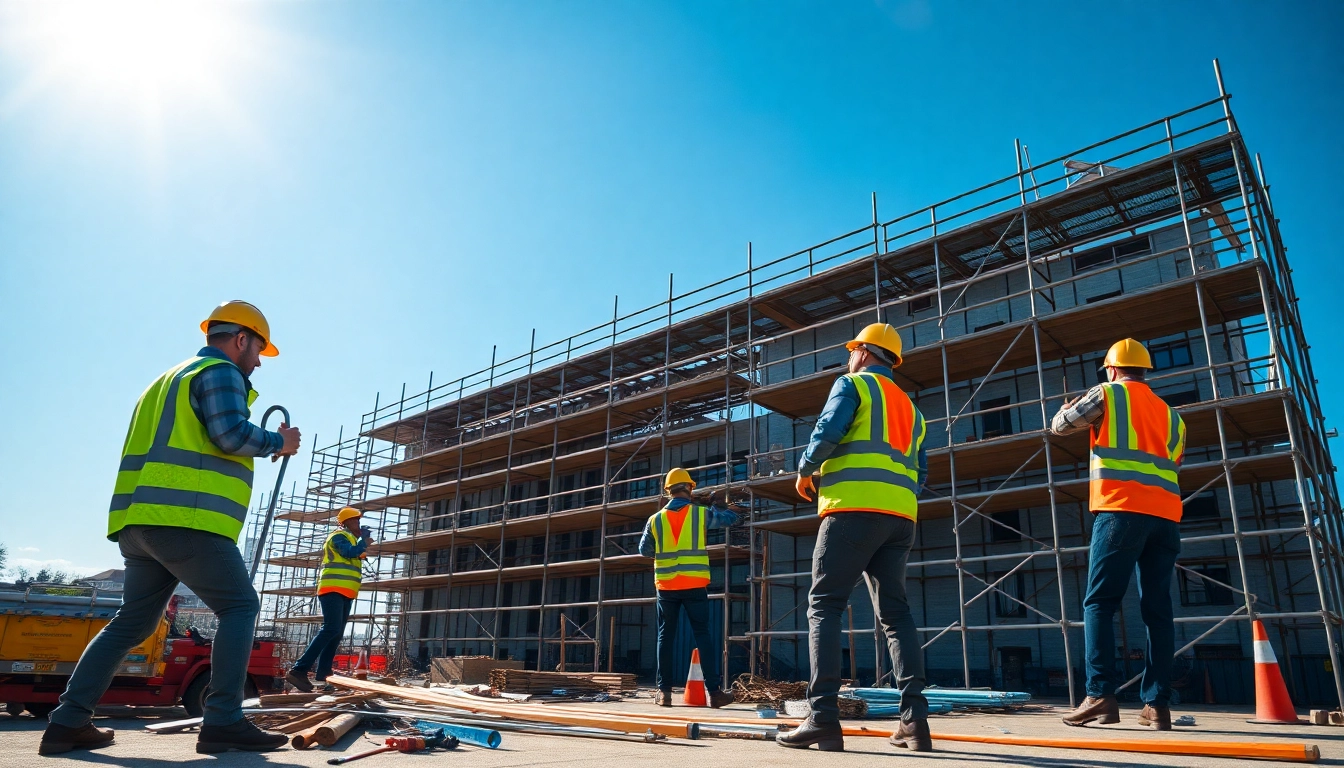Understanding the Role of Scaffolders in Construction
In the world of construction, scaffolders play a vital role. They are the professionals responsible for the assembly, maintenance, and dismantling of scaffolding systems, which support workers and materials at elevated heights. The significance of scaffolders is often overlooked, yet their work is fundamental for ensuring tasks are completed safely and effectively. For projects in Bolton, understanding their essential functions can help you appreciate the intricacies of building and renovation activities.
What Scaffolders Do
Scaffolders are trained specialists who design and construct temporary structures that support access and work on construction sites. Their primary responsibilities include:
- Creating and implementing scaffold designs based on the project’s specifications and safety needs.
- Ensuring that the scaffolding is structurally sound and can safely bear the weight of workers and materials.
- Following all health and safety regulations to mitigate risks associated with falls and other accidents.
- Conducting regular inspections of scaffolding and swiftly addressing any potential issues.
- Training and providing guidance to the onsite workforce about using the scaffold safely.
In essence, scaffolders are the backbone of many construction projects, enabling safe and efficient workflows at heights that would otherwise be inaccessible.
The Importance of Safety in Scaffolding
Safety stands at the forefront of any scaffolding operations. Statistics indicate that falls from height are a leading cause of fatalities and injuries in construction. Scaffolders are trained to create secure scaffolding systems that minimize these risks. Safety protocols involve properly securing scaffolding against adverse weather conditions and ensuring that platforms are sturdy and level.
Furthermore, comprehensive safety procedures require scaffolders to conduct risk assessments before the scaffolding can be deemed safe. The competence of scaffolders in recognizing potential hazards and implementing safety measures protects both the construction workers and the integrity of the project.
Common Types of Scaffolding Used
There are several types of scaffolding each suited for specific tasks and environments. Common types include:
- System Scaffolding: A versatile and modular approach, useful for various structures and designs.
- Single Scaffolding: Typically employed in brick masonry, it consists of standards, ledgers, and battens.
- Double Scaffolding: Used for stone masonry work, it provides additional support due to the absence of a wall.
- Suspended Scaffolding: Ideal for working on tall buildings, this type is hung from roof tops or other tall structures.
- Mobile Scaffolding: Equipped with wheels, this type allows for easy movement around a site.
Understanding the right type of scaffolding required for a project in Bolton is crucial for ensuring safety and early completion.
Choosing the Right Scaffolders Bolton for Your Project
Selecting the appropriate scaffolders is crucial for the success of any construction project. Whether tackling a residential renovation or a commercial build, here are key considerations to ensure you make the right decision when hiring Scaffolders Bolton.
Factors to Consider When Hiring Scaffolders
When searching for scaffolders, several factors should influence your selection process, including:
- Experience: Look for scaffolders with extensive experience in similar projects. Experienced scaffolders have a deeper understanding of challenges in various environments.
- Reputation: Read reviews and testimonials. A reputable scaffolding company is likely to provide higher-quality service.
- Certifications: Ensure the firm holds necessary certifications and licenses that demonstrate compliance with industry standards.
- Insurance: Confirm that the scaffolders have comprehensive insurance to cover accidents and liabilities.
- Availability: Consider whether the scaffolders can accommodate your project timelines and deadlines.
Evaluating Qualifications and Experience
It’s not enough to acknowledge the years a scaffolder has been in business; assessing their qualifications and experience is crucial. Seek firms with certified scaffolders who have undergone rigorous safety training courses like those offered by the Construction Industry Training Board (CITB).
Additionally, ask for examples of past projects. A credible scaffolding company will be able to provide you with case studies or references from prior clients demonstrating their capability to handle projects similar to yours. This can also give you insight into their work quality and time management.
Understanding Pricing and Contracts
When hiring scaffolders, understanding the pricing structure is vital to avoid unexpected costs later on. Ask for detailed quotes that break down labor, materials, and any additional costs. It is common for scaffolders to provide pricing based on daily or weekly rates, as well as fixed project costs.
Important contract elements should include the given timeframe, payment schedules, and responsibilities of both parties. Make sure any agreements are documented in writing to clarify expectations and protect yourself against any disputes.
Safety Standards and Regulations for Scaffolders Bolton
In the UK, stringent safety standards and regulations govern scaffolding practices. Understanding these laws is imperative for any construction undertaking in Bolton.
Overview of Safety Regulations in the UK
The Health and Safety Executive (HSE) enforces a plethora of regulations that scaffolders must abide by, including:
- Work at Height Regulations 2005: These set out rules to ensure that appropriate precautions are taken to prevent falls.
- Construction (Design and Management) Regulations 2015 (CDM): These regulations require all construction work to be planned with safety as a priority.
- Provision and Use of Work Equipment Regulations (PUWER) 1998: These regulations ensure that all equipment, including scaffolding, is safe for use.
Any competent scaffolding contractor will possess thorough knowledge of these regulations, ensuring that all systems meet legal requirements and best practices.
Best Practices for Safe Scaffolding
To uphold safety, scaffolders should adhere to several best practices, including:
- Regular scaffolding inspections before use and periodically throughout the project.
- Using proper equipment, including guardrails, toe boards, and safety harnesses where necessary.
- Training all personnel involved in using scaffolding to ensure they understand risks and safety measures.
- Clear communication among the team regarding roles and responsibilities concerning safety.
Implementing these principles mitigates risks and creates a safer working environment for all involved in construction projects.
Understanding Risk Assessments
Risk assessments are critical elements of scaffolding safety. A thorough risk assessment typically involves the following steps:
- Identifying Hazards: Understanding potential dangers present at the worksite, including falling objects, weakened surfaces, or electrical hazards.
- Assessing Risks: Evaluating the likelihood of potential accidents and the severity of possible injuries.
- Implementing Controls: Developing measures to mitigate identified risks, including choosing appropriate scaffolding types and materials.
- Monitoring: Continuously reviewing practices to ensure safety protocols remain effective throughout the project.
Transforming risk assessments from theoretical ideas to practical applications is essential in ensuring a secure worksite.
Innovative Scaffolding Solutions in Bolton
The landscape of scaffolding is continuously evolving, influenced by technology, sustainability, and changing architectural needs. In Bolton, innovative scaffolding solutions are becoming crucial for enhancing efficiency and safety on construction sites.
Advanced Scaffolding Techniques
These emerging techniques include:
- Digital Scaffolding: Utilizing 3D modeling software to create precise scaffolding designs before physical construction begins.
- Prefabrication: Off-site prefabrication of scaffold components that can be easily assembled onsite, promoting efficiency and reducing labor costs.
- Smart Scaffolding: Implementing IoT devices to monitor structural integrity and assess safety in real-time.
These advancements not only yield labor efficiencies but also enhance safety by reducing human error and maximizing scaffold strength.
Eco-Friendly Scaffolding Options
With the increasing emphasis on sustainability, many scaffolders are adopting eco-friendly practices. This includes using:
- Recyclable Materials: Utilizing scaffolding made from materials that can be recycled or reused.
- Energy-Efficient Practices: Ensuring equipment used in scaffolding production and assembly is energy efficient to minimize environmental impact.
- Green Certifications: Sourcing from suppliers that comply with environmental certifications to reduce the carbon footprint of construction projects.
The adoption of these eco-friendly options not only benefits the environment but can also be an attractive selling point for contractors looking to market their projects.
Case Studies of Successful Projects
Examining successful scaffolding projects in Bolton can offer valuable insights. One notable case is the scaffolding efforts during the renovation of Bolton Town Hall. The project required an intricate scaffolding system to allow multiple teams to work simultaneously on different sections of the building without compromising safety. Experienced scaffolders implemented segmented scaffolding that provided access while maintaining structural integrity throughout.
An analysis of how these scaffolders navigated challenges like uneven surfaces and adverse weather conditions highlights the value of expertise and innovative approaches in scaffolding.
FAQs About Scaffolders Bolton Services
As with any professional service, potential clients often have numerous questions regarding scaffolders in Bolton. Below are some common inquiries.
What Should I Expect from Professional Scaffolders?
Professional scaffolders should provide a complete service that encompasses:
- A thorough assessment of your project requirements and site conditions.
- Design and setup of safe, compliant scaffolding solutions tailored to your needs.
- Regular site visits and inspections to maintain safety and quality.
- Clear communication regarding progress, challenges, and any necessary adjustments.
- Assurance of safety protocols in place to protect all workers.
How Do Scaffolders Ensure Quality Work?
Quality assurance in scaffolding revolves around stringent adherence to regulations and industry standards. Scaffolders achieve quality through:
- Using high-quality materials that meet safety benchmarks.
- Insisting on continuous training and certification for their crew.
- Engaging in a thorough review of scaffolding designs and procedures before construction.
- Regularly maintaining equipment to prevent wear and potential failures.
What Makes Scaffolders Different in Bolton?
While the core role of scaffolders is largely consistent, those operating in Bolton may offer distinct advantages, such as:
- Local Knowledge: Familiarity with regional architecture and unique construction needs.
- Customized Services: Capability to offer scaffolding solutions tailored specifically to local regulations and geographical challenges.
- Community Engagement: A commitment to supporting local construction initiatives and collaboration among local businesses.
Ultimately, selecting the right scaffolders in Bolton can make all the difference in the safety, efficiency, and success of a construction project.



